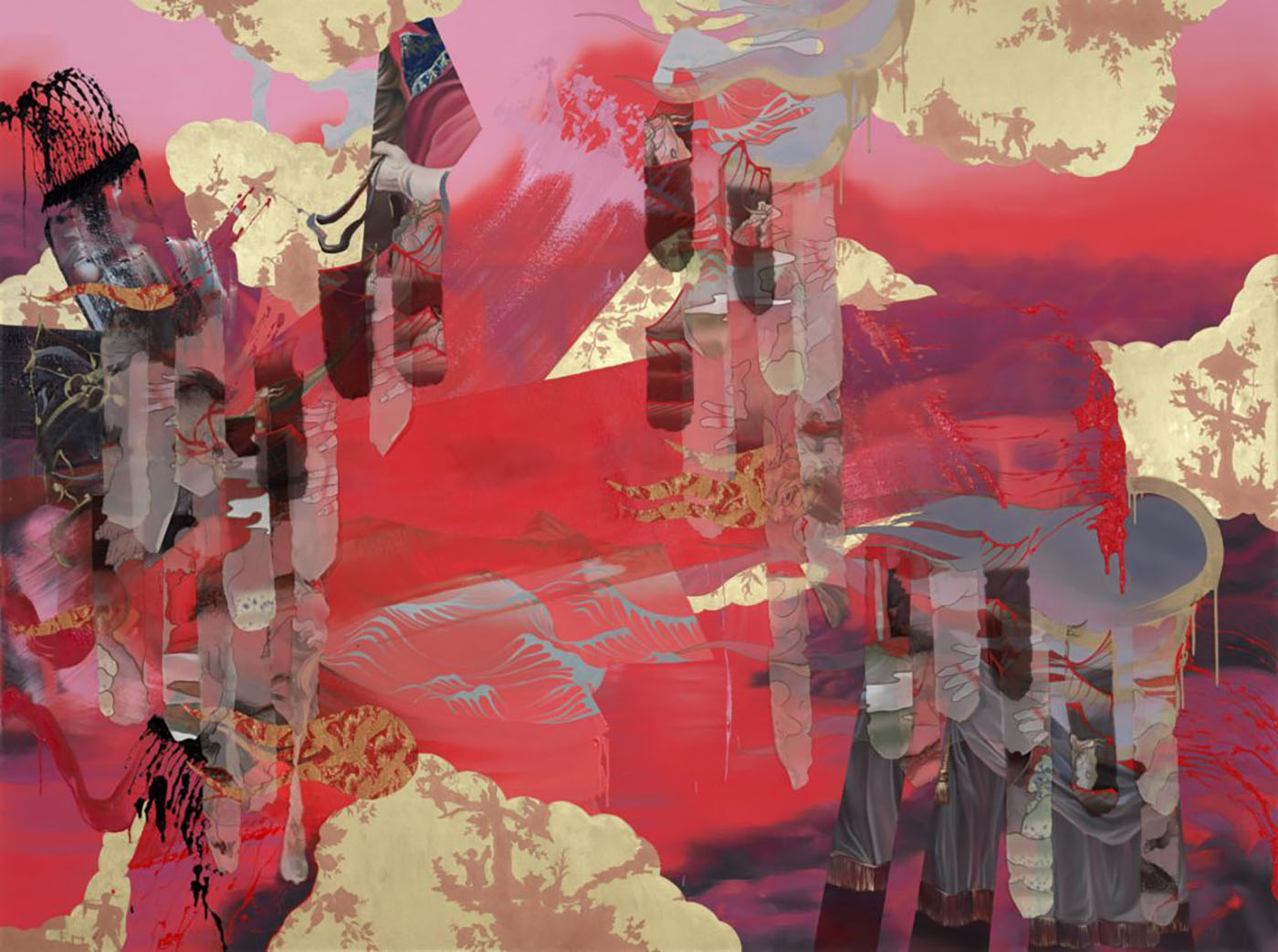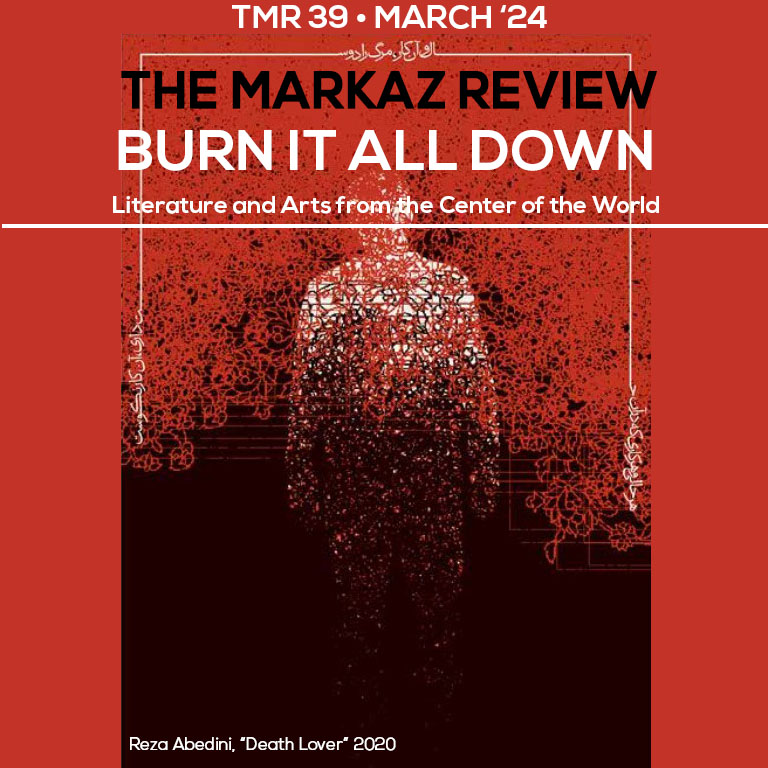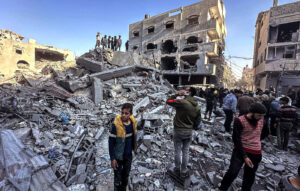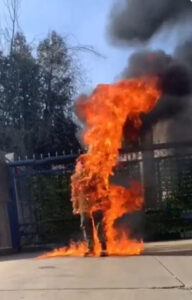Senior editor Lina Mounzer articulates the inexpressible, inconsolable feelings at a time when genocide is occurring before the eyes of the world.
“No man is an island,” famously wrote the English poet John Donne in 1623. We tend to remember that first line, as well the last (“…send not to know/For whom the bell tolls/It tolls for thee”) made famous by the Hemingway novel, For Whom the Bell Tolls. Reading these lines divorced of their essence, however, it’s easy to forget the main thrust of the poem, which is neither about the need for cooperation, as the first line is often used to remind, or about mortality, as is the last. Rather the crux is at the beginning of the final stanza, with the declaration that: “Any man’s death diminishes me/Because I am involved in mankind.”
Nothing in my own lifetime has made this fact of our collective diminishment in the face of mass death clearer than the Israeli genocide on Gaza. Of course, the lesson about this for previous generations is contained in another of these “crime of all crimes,” committed on a population forcibly incarcerated and then systematically exterminated through outright murder and slow starvation. In The Truce, Primo Levi’s memoir about the aftermath of surviving the German concentration camps, the Italian chemist turned writer describes the shame “that the just man experiences at another man’s crime; the feeling of guilt that such a crime should exist, that it should have been introduced irrevocably into the world of things that exist.”
I’ve been thinking a lot about Levi and his books since October 7. He’s always been one of my favorite writers, but his words — and entire way of conceiving the world — seem more searing and prescient than ever. As he documents the crimes of the Germans and their reverberations on the people they targeted, he maintains an insistence on an interconnected continuum of humanity, not as a banal exhortation to do good (“we are all one”) but as a simple fact, a way of reckoning with the wide-ranging horrors of the Holocaust. This is as true of abjection as it is of love. “Part of our existence,” he writes, “lies in the feelings of those near to us.”
The world we live in now, interconnected through social media, instant messaging, livestreaming, through the open channels, audio and video, into the lives and feelings of so many others across the world has only served to expand that category of people, of those we deem “near to us.”
Al-Thakla—Arabic as the Original Mourner by Abdelrahman ElGendy
Yesterday morning, I woke up to a text from my friend Omar, who is away from Lebanon for a semester, giving a workshop at a university on the West Coast of the US. I’d been checking in to see how he was and to ask how a recent event had gone.
“Everything is garbage,” he’d written back, “the fucking horrors of Palestine are underlying everything. It’s undeserved to want to feel any goodness or pleasure. That last massacre is a nightmare. Why should any of us be doing anything other than burning the whole world down.”
When the editorial team came up with the theme for this issue of TMR, we were still only maybe a month and a half into the genocide on Gaza. We were having one of our meetings on Zoom, and had reached the by-then regular part of the meeting where we shared our outrage and horror at what we were witnessing, day in, day out, during this first-ever livestreamed genocide. We talked about what we were reading on social media, what our friends were expressing, what we ourselves were feeling. Overwhelmingly, week after week it was: nothing will ever be the same. There is no coming back from this. We are all irrevocably changed. It is an entire system that’s rotten, an entire order of the world. The disgust, the collective shame we — the team, our friends, our acquaintances, strangers on social media — all felt was so profound, so combustive, it amounted to a rejection of the entire world, the one where “such a crime should exist.” The only thing to do is to burn it all down.
The Time of Monsters by Layla AlAmmar
Again and again and again and again, I’ve seen this sentiment repeated. Burn it the fuck down. Burn it down: this system where the most respected news organizations run pieces of manufactured propaganda that would make Leni Riefenstahl cringe, where blatant, unsubstantiated lies are acted upon immediately by the world’s highest authorities, where the governments sending the bombs try to garner goodwill by airdropping some crumbs to a starved population, where people march in their tens of thousands across the planet every week and still cannot budge government policy in so-called democracies, where language is twisted so thoroughly that all meaning is throttled and choked out of it. Burn all of it down.
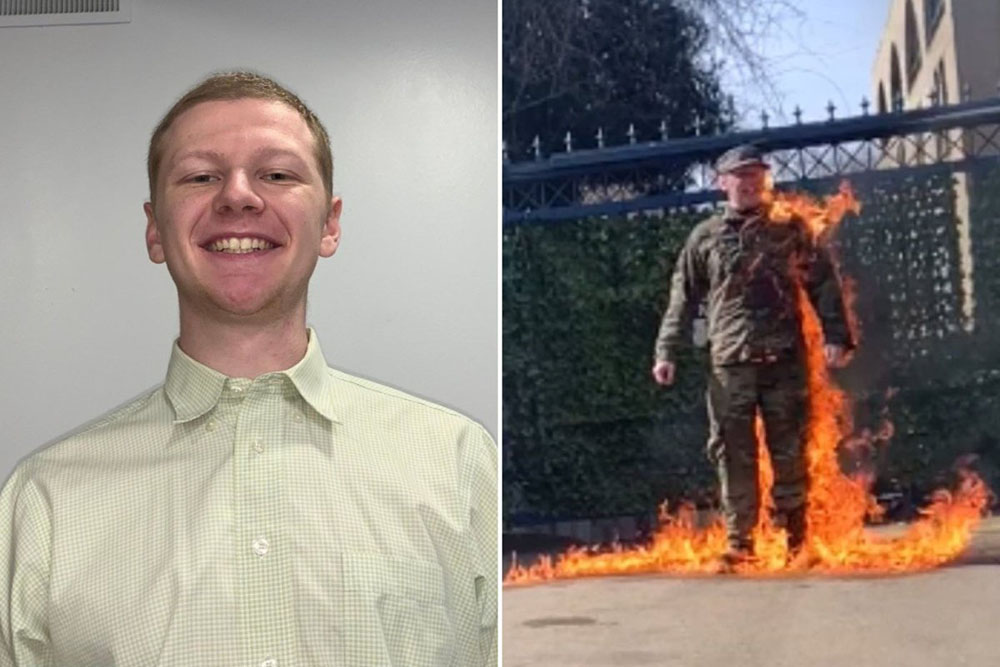
And then, on February 25, 2024, one man seemed moved to do exactly that. Aaron Bushnell, 25, an active-duty service member of the USAF stood outside the Israeli embassy in Washington DC, and, after declaring that he would no longer be complicit in genocide, poured some kind of accelerant over his head and body and set himself on fire. Until his last breath, he screamed: Free Palestine! Free Palestine! Free Palestine! Unlike the previous person who self-immolated for the same reason late last year in Atlanta, Georgia, Bushnell’s act couldn’t be covered up by the powers that be. He livestreamed the whole thing.
“The Map of a Genocide Victim”—fiction from Faris Lounis
And because they couldn’t suppress news of it, the guardians of the system worked to discredit him. Of course they did: despite its visceral effect, self-immolation is fundamentally a symbolic act. An individual act meant to affirm our interconnectedness. An act of self-sacrifice meant, through its spectacular violence, to literally embody both personal outrage over oppression and to force the oppressor to look. Look, it says, it screams: This is the extent of your depravity. Upon my body I inscribe the measure of your own violence. And it is an individual act meant to rouse collective action. We all watched how Mohammad Bouazizi’s self-immolation turned into a spark that lit the Arab world on fire. Bouazizi was a man who turned himself into a metaphor; by transcending the bounds of self in that way, he became a regionwide revolution.
Four Books to Revolutionize Your Thinking
The media can shout themselves hoarse about Aaron Bushnell’s poor mental health and how it drove him to the despair of self-immolation. It does not change the fact that the act itself, undertaken for an explicit cause, is so clear and clarifying in its symbolism that a person’s individual mental state upon the commission of the act is a moot point. It certainly takes a kind of “madness” to embrace one extreme of the nature of our humanity, that of our interconnectedness. But I would argue that it is also a kind of madness to embrace the other extreme, that of hyper-individuality: To refuse to see how we are all part of a continuum and to openly express disdain for those who do. The problem is that we live in a world, in a system, that has entirely normalized and indeed encouraged one extreme and pathologized, even criminalized, the other. Burn it. The fuck. Down.
Do or Despair: Political Action in My Great Arab Melancholy Katie Logan
Genocide is a collective horror, an abjection of all humanity. Levi calls it an offense of “incurable nature… that spreads like contagion. It is foolish,” he tells us, “to think that human justice can eradicate it.” What counts for justice anyway in the face of such atrocity? It is a loss of collective heritage and individual people, each a universe unto themselves. The entire fabric of a place eradicated. What justice might bring it all back? Nothing will bring Reem back to her grandfather; nothing will re-knit Sidra’s little limbs back together; nothing will resurrect Refaat to his classroom; nothing will reconstitute a man flattened into viscera, the lurid red of blood and guts smeared against the yellow-orange of fat; nothing cleanses the flour from the blood of those who were murdered for it, and who died hungry besides.
We know all this, which is why so many of us appeal to “history.” The current time scale contains so much grief, so much unfathomable loss, that the only way we can conceive of it is by thinking of it as past, as lesson.
One day, we vow, the world will look back and know what it has done. With these words we try to evoke a future where the immediacy of the horror has been diminished. One where even the mourners themselves are all dead and gone, but where they have perhaps, by their collective grief, earned a better world for their descendants.
Genocide: “That bell can’t be unrung. That thought can’t be unthunk.” Amal Ghandour
And yet the mere existence of this genocide on the heels of last century’s most famous Holocaust shows us that even time cannot mete out this blandly equalizing consolation if we don’t learn the correct lessons from history.
Levi, in fact, warned us. “If understanding is impossible,” he wrote, “knowing is imperative, because what happened could happen again. Conscience can be seduced and obscured again — even our consciences.” By “our,” here, I presume he meant the Jewish people, or in any case, the “just” who feel “shame… at another man’s crime.”
Many like to point out the irony that the descendants of those who experienced the Holocaust are now enacting another one, on another people. As if that were an explanation somehow. But that is again the wrong lesson from history, insisting on our division into separate categories, so that the Holocaust becomes singular, incomparable, something only ever possible as an atrocity perpetrated by the Germans against the Jews and nothing else. Thus, Israel can only be conceived of as the “happy ending” to the Holocaust and the Palestinians as inconvenient obstacles to that happy ending. As a result, ordinary people accept it as obscene that comparisons should even be made between the Holocaust and any other genocide, but especially this one, ongoing since 1948, which casts the Israelis forcibly in the role of the Nazis.
But Levi again provides a different possibility of how to look, for in his chemist’s reliance on reasonable, rather than sentimental, exegesis, he is more concerned with universal root causes. For him, the hate that spurs such evil is “a poison fruit sprung from the deadly trunk of Fascism.” And even though it is beyond understanding, “we can and must understand from where it springs, and we must be on our guard.”
His formula is in fact simple. “In every part of the world,” he warns, “wherever you begin by denying the fundamental liberties of mankind, and equality among people, you move toward the concentration camp system, and it is a road on which it is difficult to halt.”
Thus, Zionism and its fascist supremacy is the culprit, a fascist supremacy that in fact predates the Holocaust. Thus, the original Nakba has led to this second Nakba, has rooted itself in the sadistically complicated apartheid system of the West Bank, and has corrupted Israeli society to such an extent that some of its people block aid to a starving population and the rest of them simply cannot comprehend the reactions of disgust at their army’s depraved TikToks or the existence of their gleeful snuff channels.
Which recalls Levi’s most important reminder: “We must remember,” he tells us, “that these faithful followers [of Fascism], among them the diligent executors of inhuman orders, were not born torturers, were not (with a few exceptions) monsters: they were ordinary men. Monsters exist, but they are too few in number to be truly dangerous. More dangerous are the common men, the functionaries ready to believe and to act without asking questions.”
Again, an insistence on a continuum of humanity, not a division into fundamental monsters and forever victims, and a reminder that supremacist ideology is the root of the “crime of crimes,” which is no less than seeking to deny to others the life and dignity we seek for ourselves.
The Story of the Keffiyeh by Rajrupa Das
As such, I’m proud to present this issue of TMR on behalf of our whole team, in which various writers grapple with the systems so many of us are seeking to burn down today, and in so doing, insist, like Levi, on a continuum of humanity. What they have collectively produced here is an outraged cry against what is happening, but also an affirmation of our shared commitment to one another through the mere expression of that collective outrage. No: No justice is possible in this or any lifetime. No: No writing, no art, no language, no witness is consolation for any of the dead or the unlanguagable loss.
The fight ahead for a better world is still long, probably interminable and many, many more will die in pursuit of it. We don’t have a system that respects life, nor is it a system that can be, at once and instantly, all burned down to ash, much as we would like it to be. All we have is what Palestine, more than any other cause in our lifetimes, has given us: our shared rejection of this system, our growing ability to name its ills. And, a gradual embrace of the fundamental truth that so many writers have tried to remind us of: that we all depend on one another, that we are all diminished by a people’s destruction or oppression, no matter where it occurs. To embrace that isn’t justice, but it is a kind of dignity on behalf of life itself.
* See “UNRWA loses funding after charges that some employees took part in Hamas attack,” NPR, Jan. 29, 2024.



